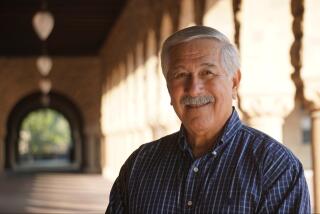PhD in the school of life
Rueben Martinez is known for his many callings: Barber. Longtime bookstore owner. MacArthur award winner. Speaker at high schools, colleges and universities across the country. Holder of more honorary degrees than he can count.
And now Martinez, 68, is a college professor. A presidential fellow, to be exact.
Starting next month, Martinez will be responsible for Chapman University’s efforts to recruit first-generation students, especially Latinos, into science and math programs.
University administrators said the fellowship is part of a twofold strategy of boosting its science enrollment while more aggressively recruiting students from such central Orange County communities as Santa Ana, Anaheim and Orange -- where the 6,000-student campus is located.
Martinez said that during his visits to high schools, he likes to conduct one-on-one interviews with rapid-fire questions to find out about students’ interests and determine how serious they are about pursuing their education.
“What I tell these kids today is that a college degree can be a reality,” he said. “I tell them: ‘If you don’t like high school you’re going to dig college, man.’ ”
After cutting hair for decades, Martinez began selling books out of his barbershop in 1993, and he later moved into a storefront on downtown Santa Ana’s Main Street. His shop, Libreria Martinez, has become a pillar of the Latino literary community.
Martinez was thrust into the national spotlight in 2004 when the MacArthur Foundation awarded him a $500,000 fellowship for promoting literacy. The unrestricted money, spread out over five years, has gone to start a nonprofit group that offers after-school classes and tutoring as well as paying some of his bookstore’s bills.
University administrators said they enlisted Martinez to work against an image of private universities as exclusive bastions that are out of reach of low-income high school students. Chapman’s $36,000-a-year price tag doesn’t help, they said.
“First-generation students, they hear the word ‘private’ and they hear ‘country club’ and exclusive and ‘not available,’ ” even when administrators explain that more than 80% of students receive some sort of financial aid, said Mike Pelly, Chapman’s vice chancellor in charge of admissions.
Chapman has become a school with an increasingly national reach, best known for its business and film programs. More than three-quarters of its students are from outside Orange County. But administrators believe they may have gone too far.
With a 10% Latino student population, “We are very much in line with most universities,” Chancellor Daniele Struppa said. “But we are located in a very heavily Latino section of the country. We are really next-door neighbors. So the question is, why don’t we get more interest?”
Donald Cardinal, dean of the College of Educational Studies, where Martinez will work, said Martinez’s contacts in the Latino community and in schools could break down some perceived obstacles.
“He’s like a pied piper of sorts,” he said. “I could call a school district 10 times and say ‘I want to talk to your students,’ but they still have this idea that their students can’t afford to come here.”
He has asked Martinez to refer to the university as independent rather than private and that he act as an advocate for college in general while explaining that Chapman is one of many options. He has otherwise placed few limits on Martinez.
The fellowship is also part of an increased focus on science and technology at Chapman.
Earlier this year, the university established the Schmid College of Science, made up of the science, health sciences, math and psychology departments with more than 700 students enrolled so far. Chapman is hiring more faculty, and wants the students to match.
Luis Ortiz-Franco, a mathematics professor who has taught at Chapman for more than 20 years, said the need for diversity is great -- he knows of only two math majors who are Latinos.
But he is skeptical that Martinez on his own would be able to boost the numbers unless the university ties him to a scholarship program and an on-campus office that would support Latino and first-generation college students.
“In my view, the university would have to invest resources in creating a permanent pipeline that brings Latino students into the math and sciences,” he said.
Pelly, the admissions vice chancellor, said that Chapman plans to commit more scholarship money to math and science students.
But even hiring Martinez was not sure a sure bet. Martinez balked when Cardinal approached him, saying that he lacked the standard credentials. “I have a high school diploma, how am I qualified to do this job?” Martinez recalled asking.
But he has slowly come around to thinking of himself as an educator. When he recently received a letter from Chapman addressing him as Professor Martinez, it was such a source of pride that he showed it to all of his bookstore customers.
“I’ve walked through campuses all my life but never attended classes,” he said. “Who would ever think that people would be calling me professor?”
As he has slowly gotten acquainted with his new office on the second floor of a white neoclassical building, he has also set his first goal: to persuade 10 top students to come to Chapman and stay. He compares it to selling a good book.
“In a way, I’m going to be a salesman,” he reflected. “But I’ll be selling ideas.”
--
More to Read
Sign up for Essential California
The most important California stories and recommendations in your inbox every morning.
You may occasionally receive promotional content from the Los Angeles Times.











